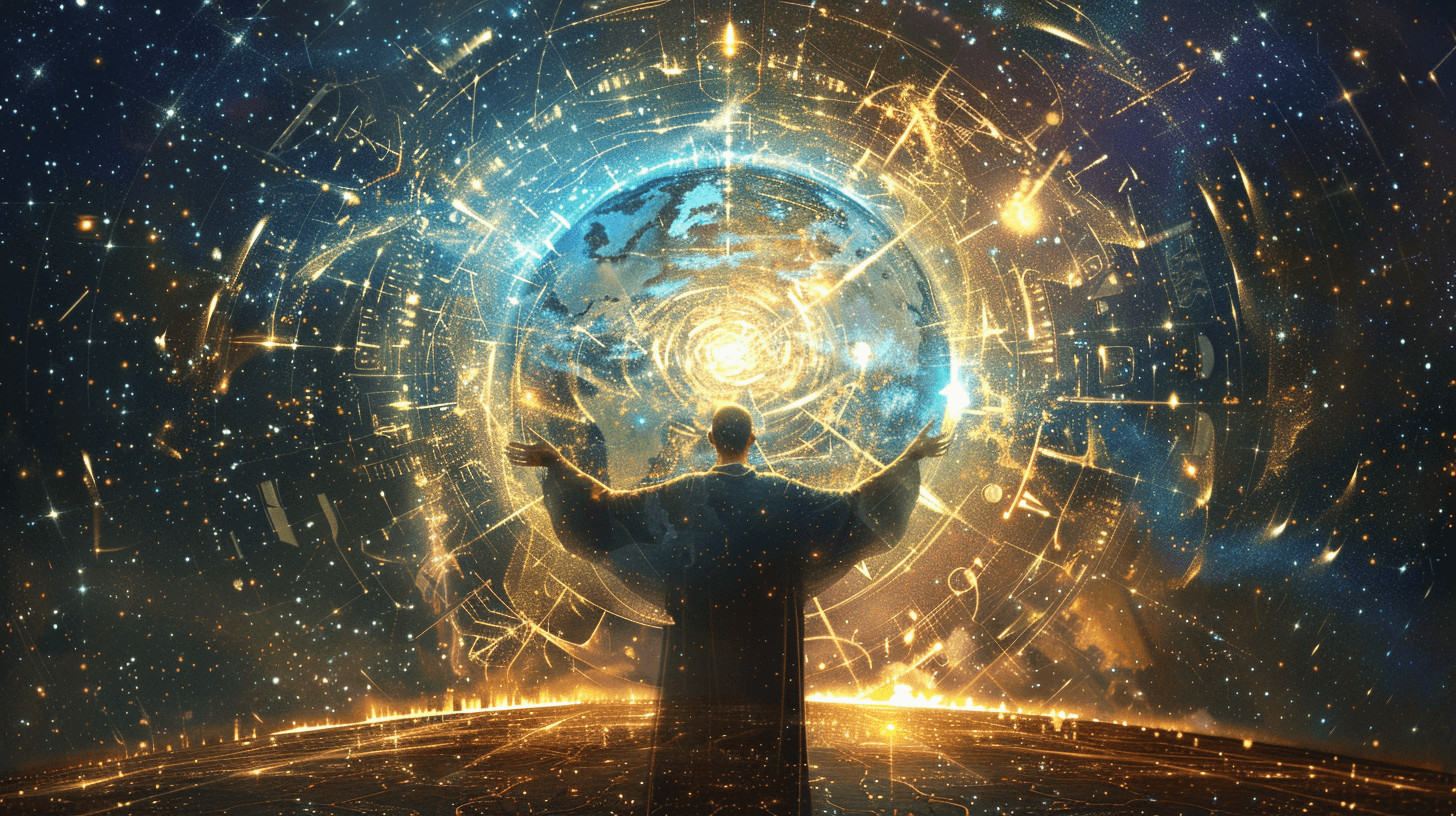Introduction

Politics, as it stands today, is a battlefield. Nations compete for power, ideologies clash, and leaders, driven by ego and fear, seek to control the narrative of progress. Across the globe, governments operate under the banner of separation: my country versus yours, my people versus theirs, my economy over everything else. This system has led to global conflict, environmental destruction, and the disenfranchisement of millions. Yet, in this chaos, we find ourselves at a turning point—a moment when humanity can choose a new path, one that transcends ego-driven power dynamics and leads us toward a conscious revolution in global leadership.
The future of politics will not be found in incremental policy changes or shifting alliances; it will be forged through a quantum leap in consciousness. As humanity begins to awaken to the quantum understanding of reality—that consciousness shapes the universe and that we are co-creators of this reality—a new form of leadership will emerge, one based on universal awareness, ethical governance, and interconnectedness. This revolution in consciousness, which I call Quantum Politics, will fundamentally transform how political systems are structured, how leaders lead, and how nations interact with one another.
At the heart of this shift is the recognition that we are not separate entities—nations, leaders, or individuals competing for limited resources. Instead, we are all interconnected beings, part of a larger cosmic reality, in which the intention and awareness behind our actions directly shape the outcome of our collective future. Only by awakening to this higher reality can we create political systems that foster global peace, sustainable governance, and the flourishing of all life.
The Quantum Understanding of Consciousness
To grasp the essence of Quantum Politics, we must first understand the quantum nature of consciousness itself. Quantum physics has revealed that reality is not fixed, deterministic, or separate from the observer. Instead, it operates according to principles that mirror the spiritual teachings of interconnectedness, unity, and co-creation. At the quantum level, particles exist as probabilities—waves of potential that only collapse into a fixed state when observed. This means that the very act of observation—conscious awareness—plays a role in shaping the outcome of reality.
In the same way, our collective consciousness—the thoughts, beliefs, and intentions of humanity—shapes the global reality we experience. If we view the world through the lens of fear, separation, and scarcity, we will create a world that reflects those beliefs—one marked by conflict, competition, and division. However, if we approach reality with an awareness of unity, compassion, and abundance, we will create a world that reflects those higher ideals.
Politics, as a system of governance, is a direct reflection of the collective consciousness of those who participate in it. The current state of global politics—rife with conflict, corruption, and inequality—mirrors the egoic consciousness that dominates much of humanity. Political leaders, driven by their own egoic desires for power, control, and personal gain, make decisions that benefit the few at the expense of the many. Nations compete for resources, engage in wars, and exploit the environment because they are trapped in the illusion of separateness—the belief that their interests are separate from the well-being of others.
The Ego in Politics: Power, Control, and Division
At the core of the political dysfunction, we witness today is the ego. The egoic mind thrives on division—it sees the world in terms of “us versus them” and believes that power, control, and domination are the keys to security and success. In this paradigm, political leaders operate not as stewards of their nations or the planet, but as manipulators of power, seeking to outmaneuver their opponents and solidify their own status.
The egoic mind also drives the creation of hierarchical systems, where power is concentrated in the hands of the few, and the voices of the many are silenced. In such systems, the well-being of the planet and humanity as a whole becomes secondary to the interests of a select few. This leads to corruption, inequality, and the exploitation of natural resources, as leaders prioritize short-term gains over long-term sustainability.
In addition to division and power, the egoic mind is rooted in fear—fear of losing control, fear of being outcompeted, and fear of the unknown. This fear drives nations to militarize, build walls, and engage in conflict rather than cooperation. It fosters a mentality of scarcity, where nations hoard resources, exploit the environment, and prioritize economic growth at the expense of ecological balance. The result is a world in crisis—a world on the brink of environmental collapse, geopolitical instability, and social unrest.
The Conscious Revolution: Awakening to Co-Creation
The solution to this crisis does not lie in superficial political reforms or changing the faces of leadership. It requires a quantum leap in consciousness—a shift from ego-driven politics to Quantum Politics, where leaders awaken to their role as co-creators of reality and recognize the interconnectedness of all life. In this new paradigm, political systems will be structured around the principles of unity, cooperation, and ethical governance.
The conscious revolution begins with the recognition that political leadership is not about control or domination, but about stewardship. Leaders who are awake to the quantum nature of reality understand that their thoughts, intentions, and actions have far-reaching effects on the collective consciousness. They recognize that the well-being of their nation is inextricably linked to the well-being of the planet and all its inhabitants. As such, they lead with an awareness of the greater whole, making decisions that benefit humanity as a collective, rather than serving narrow, self-interested agendas.
In Quantum Politics, leaders will no longer operate from a place of ego or fear. Instead, they will cultivate a state of higher awareness, guided by principles of love, compassion, and interconnectedness. This shift in consciousness will fundamentally transform the way political systems are structured and the way decisions are made.
How Quantum Politics Will Reshape Global Leadership
Quantum Politics will usher in a new era of global leadership, one in which the egoic structures of power, control, and division are replaced by systems of cooperation, ethical stewardship, and conscious governance. Here are the key ways in which Quantum Politics will reshape global leadership:
- Leadership Based on Conscious Awareness
Future political leaders will no longer be chosen based on charisma, wealth, or political connections. Instead, leadership will be entrusted to individuals who have cultivated a state of conscious awareness—leaders who have transcended their egoic desires and operate from a place of universal love and compassion. These leaders will prioritize the well-being of all life, recognizing that the success of their nation is intertwined with the success of the planet and its people.
- Decisions Guided by Unity and Interconnectedness
In Quantum Politics, decisions will no longer be made from a place of fear, scarcity, or separation. Instead, political leaders will make decisions based on an awareness of interconnectedness—the understanding that all life is one, and that the actions of one nation affect the whole. This will lead to a new era of cooperation between nations, where global challenges such as climate change, poverty, and inequality are addressed collectively, rather than through competition and conflict.
- Ethical Governance and Stewardship of the Planet
Quantum Politics will emphasize the role of political leaders as stewards of the planet, entrusted with the responsibility of protecting and preserving the Earth for future generations. Policies will prioritize sustainability, ecological balance, and the well-being of the planet, rather than short-term economic gains. Environmental protection will no longer be a secondary concern but the foundation of governance.
- Global Peace through Conscious Cooperation
Global peace will not be achieved through military dominance or the threat of force. Instead, peace will emerge from the recognition that all nations are part of a larger whole and that the well-being of one nation is inseparable from the well-being of others. Leaders will engage in diplomacy and cooperation, resolving conflicts through conscious communication and mutual understanding. The arms race will give way to an arms embrace, as nations come together to promote peace, unity, and shared prosperity.
- A New Model for Economic and Social Justice
Quantum Politics will replace systems of economic exploitation and inequality with systems of fair distribution and social justice. Leaders will recognize that true prosperity comes not from the accumulation of wealth by the few but from the equitable sharing of resources among all people. Economic systems will be restructured to prioritize the well-being of all citizens, ensuring that basic needs such as food, shelter, healthcare, and education are met for everyone, regardless of social status or wealth.
Conclusion: The Birth of Quantum Politics
The world is ready for a new form of leadership—one that transcends the egoic mind and embraces the principles of cosmic consciousness. Quantum Politics is not just a theory; it is the future of global leadership, a conscious revolution that will reshape how we govern ourselves, how we interact with one another, and how we care for the planet.
As we awaken to our role as co-creators of reality, we will realize that politics is not about power or control but about stewardship and compassionate governance. The leaders of the future will be those who understand the interconnectedness of all life. This awareness will guide them to promote policies and initiatives that reflect a commitment to the global good, transcending old paradigms of nationalism and competition.









